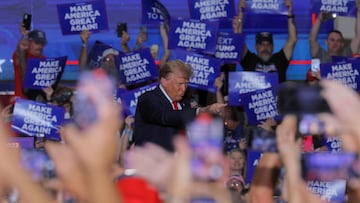Donald Trump’s new policy idea is reminiscent of the horror film ‘The Purge’
Donald Trump’s new policy to fight retail theft sounds more like the plot of a horror film than a reasonable policy suggestion.


New videos of Donald Trump describing his new policy to fight crime are reminding many on social media of ‘The Purge.’
Trump yesterday called for a new Kristallnacht pic.twitter.com/t3p1aupfgK
— Aaron Rupar (@atrupar) September 30, 2024
The comments were made during a rally in Pennsylvania, where he said that “one really violent day” could solve the problem of theft at “drug stores, for example.” Clips from the bizarre moment were put together by Aaron Rupar, who follows rallies from both candidates closely. Towards the end, the former president says, “One rough hour, and I mean real rough, the word will get out, and it will end immediately.” By “it,” it is assumed that Donald Trump is referring to crime and that the strong law enforcement presence would scare people into not committing crimes.
What about white-collar crime?
Such a theory fundamentally misunderstands the root causes of crime, which have much more to do with poverty and a lack of resources that push people to make choices that they might not otherwise make if they felt they had other options. And when Donald Trump is talking about criminals, he doesn’t seem interested in targeting white-collar crime, like tax evasion, wage theft, and various types of fraud. Those criminals are actually the ones who might be most likely to be subdued by physical violence or even the threat of jail time since they so often are not punished or persecuted by law enforcement.
Demos, an organization focused on combating income inequality, released a report that found that the private sector obtains an additional $15 billion by paying some workers less than the minimum wage, which is just one form of wage theft. Retailers lose around $14.3 billion to shoplifters each year. Another form of wage theft is not paying workers overtime, which is charged at time and a half. Over the weekend, Donald Trump said he hated paying overtime as an employer.
Donald Trump “hates” paying overtime
“I know a lot about overtime; I hated it,” said the GOP nominee in the same speech. Instead, he would “get other people in” instead of paying overtime.
This isn’t a gaffe and he didn’t just misspeak — Trump said this in Michigan on Friday and Pennsylvania today. Trump cut overtime for millions of Americans as President — and his Project 2025 agenda will do it again. https://t.co/vOB1676qpV
— AFL-CIO ✊ (@AFLCIO) September 29, 2024
Related stories
Such a comment is interesting because it is not inherently bad, but it doesn’t appear from the context that Trump meant he would lighten the workload for his employees by bringing in new staff.
Instead, he seems to admit that as a boss, when people asked for overtime, he would replace them. And the businessman-turned-politician is not alone in his hatred for overtime. In September alone, the Department of Labor announced actions to recover stolen wages, where, in many cases, overtime was denied illegally, totaled more than $6 million.
Complete your personal details to comment